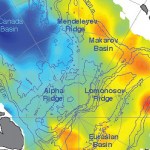arctic ocean
The sun heats the earth, but unevenly. The excess heat around the equator moves towards the poles, via a number of different mechanisms, the most noticeable for us humans being via air masses. That's what much of our weather is about. Heat also moves towards the poles, in the ongoing evening-out of energy distribution on the planet's surface, via ocean currents.
One of the interesting things that happens with ocean currents is this: Warm water tends to move from equator towards polar regions across the surface, then cools down and drops to the deep sea, where it moves back south again,…
The good folks at the National Snow and Ice Data Center summarize the season in the Arctic Ocean. Turns out that the weather conditions that helped make 2007 a record for low sea-ice extent didn't recur. And yet, 2011 came within a relative hair's breadth of setting a new record. That means longer-term climate trends are to blame, not seasonal weather variation. The low-down:
Why did ice extent fall to a near record low without the sort of extreme weather conditions seen in 2007? One explanation is that the ice cover is thinner than it used to be; the melt season starts with more first-year…
